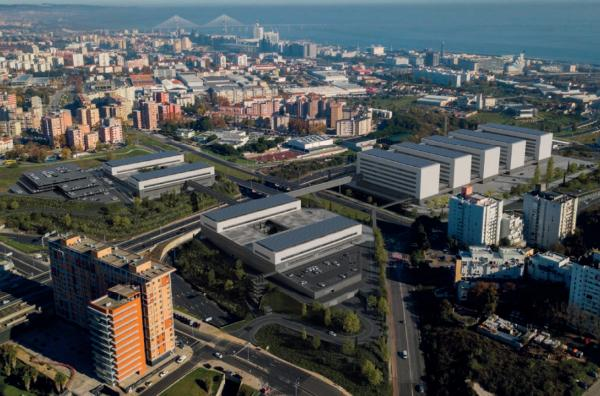
- The EIB's contribution can amount to a maximum of €190 million in a long-term loan.
- The new hospital will replace six old hospitals, spread over more than 100 buildings in the city centre.
- The project helps increase the resilience of the health sector by creating functional, flexible and modern hospital infrastructure.
The European Investment Bank (EIB) and the society led by Mota-Engil have signed an agreement for a €107 million loan to finance the Hospital de Lisboa Oriental. This financing will enable access to modern health services and a better distribution of beds throughout the city. The project will reinforce the quality of healthcare services and the conditions for high-quality education and scientific research, while making it possible to use resources efficiently.
The new hospital project was developed by the consortium selected under a public-private partnership (PPP), which is mostly made up of companies from the Mota-Engil Group. It will have 875 inpatient beds and be located in Marvila, in the east of Lisbon, replacing the current healthcare facilities located in the city centre of the Portuguese capital.
The new site is easily accessible from Lisbon's ever-growing suburban areas, including by public transport. The construction of the hospital also complements plans to redevelop the area of the city near the old harbour, which is currently relatively run-down. The cost of the project is estimated at around €380 million and construction is scheduled to begin in early 2024.
This investment reflects the general objective of the healthcare reforms and strategic plans carried out in the country over the last two decades, aimed at reducing costs and increasing the efficiency of the healthcare system. By improving and strengthening the provision of universally accessible public services, the project will also address health inequalities, one of Portugal's main challenges in this sector.
"The EIB is financing much-needed infrastructure for the city of Lisbon, enabling the improvement of health services through modern and convenient infrastructure”, said Alessandro Izzo, Head of Equity, Growth Capital and Project Finance do BEI. “We are happy to make this financing possible under favourable conditions, thereby attracting other investors who would otherwise be discouraged by the long term of the loan, especially in a context characterised by rising interest rates and high volatility."
This project is the EIB's first direct loan to a hospital in Portugal, which continues to be interested in supporting the national health sector by financing other projects that make a visible contribution to improving healthcare services.
Background information
EIB
The European Investment Bank (ElB) finances sound investments that contribute to EU policy objectives. EIB projects bolster competitiveness, drive innovation, promote sustainable development, enhance social and territorial cohesion, and support a just and swift transition to climate neutrality.
The EIB Group, which also includes the European Investment Fund (EIF), signed a total of €88 billion in new financing for over 900 projects in 2023. These commitments are expected to mobilise around €320 billion in investment, supporting 400 000 companies and 5.4 million jobs.
All projects financed by the EIB Group are in line with the Paris Climate Accord. The EIB Group does not fund investments in fossil fuels. We are on track to deliver on our commitment to support €1 trillion in climate and environmental sustainability investment in the decade to 2030 as pledged in our Climate Bank Roadmap. Over half of the EIB Group’s annual financing supports projects directly contributing to climate change mitigation, adaptation, and a healthier environment.
Approximately half of the EIB's financing within the European Union is directed towards cohesion regions, where per capita income is lower. This underscores the Bank's commitment to fostering inclusive growth and the convergence of living standards.